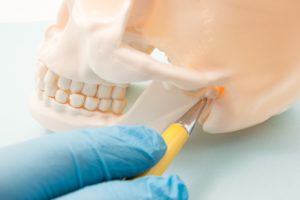
It is easy to take good oral health for granted and not even think about how wonderful it is to live pain-free. There are many awesome benefits to having a healthy smile, such as freely enjoying your favorite foods and speaking with ease to your family and friends. However, when you suffer from TMJ disorder, you realize how significant it is to be able to do these things with comfort. Fortunately, there are treatments to help ease the pain and help you return to normal life. Read on to learn how long you can expect TMJ treatment to typically take effect and possible treatment options.
First Things First: What Is TMJ Disorder?
TMJ disorder (TMD) is a painful condition that affects the temporomandibular joint (the joint that connects the jawbone to the skull). It can be caused by various reasons, such as teeth grinding, arthritis, stress, and dental trauma. Unfortunately, it causes a range of symptoms, including restricted jaw movement and major discomfort in your jaw area, which makes it difficult to do everyday activities like eating, speaking, and sleeping. If you leave TMJ disorder untreated, it can grow worse over time and cause long-term damage to the temporomandibular joint.
How Long Will the Treatment Take to Ease Symptoms?
While improvements for TMJ disorder will vary for everyone, treatment can take a few weeks to several months to see significant improvement. The range of ease of symptoms will depend on several factors, such as the severity of the disorder, the chosen treatment, and the condition of your overall health.
Possible TMJ Disorder Treatments & How Long They Take
Luckily, many dentists offer a wide range of specialized treatments to help treat TMJ disorder. The type of treatment will be based on what your dentist thinks will help you the most and give you the quickest, most effective relief. Here are some common treatment options:
- TENS machine treatment: The TENS (Transcutaneous Electrical Nerve Stimulation) machine sends gentle electric currents into the muscles through small electrode patches placed on the face and jaw. It has been proven to reduce pain and inflammation, as well as stimulate blood flow.
- Occlusal splint: This small oral appliance is worn to bed and protects the teeth from bruxism (teeth grinding). It can also slightly move the jaw into a more relaxed and natural position, allowing the muscles to heal and create a more open airway.
- Botox injections: While commonly used to treat facial wrinkles, Botox also can help ease overactive jaw muscles. This can not only provide immediate relief from TMJ but help bring relief from chronic teeth grinding and create a more defined jawline.
About the Author
Dr. Sara Saba and her team at Exceptional Dentistry are eager to help you with any oral health issue, including TMJ disorder. She earned her dental doctorate at the University of Maryland at College Park and has completed many other additional courses. With a 5-star rating on Google, Dr. Saba provides a full range of services to treat jaw, neck, and ear pain. To schedule an appointment, contact her through her website or call (301) 460-3331.
